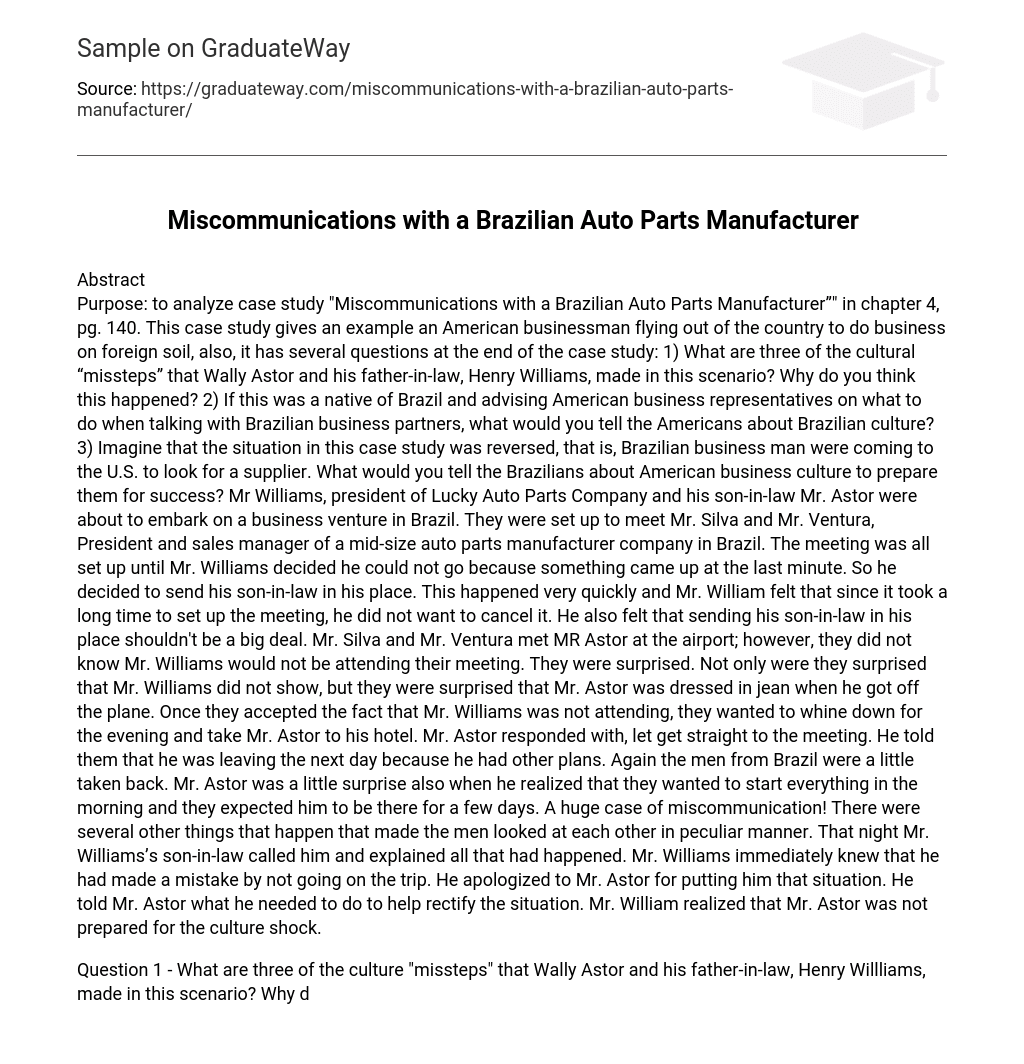Purpose: to analyze case study “Miscommunications with a Brazilian Auto Parts Manufacturer”” in chapter 4, pg. 140. This case study gives an example an American businessman flying out of the country to do business on foreign soil, also, it has several questions at the end of the case study:
- What are three of the cultural “missteps” that Wally Astor and his father-in-law, Henry Williams, made in this scenario? Why do you think this happened?
- If this was a native of Brazil and advising American business representatives on what to do when talking with Brazilian business partners, what would you tell the Americans about Brazilian culture?
- Imagine that the situation in this case study was reversed, that is, Brazilian business man were coming to the U.S. to look for a supplier. What would you tell the Brazilians about American business culture to prepare them for success?
Mr Williams, president of Lucky Auto Parts Company and his son-in-law Mr. Astor were about to embark on a business venture in Brazil. They were set up to meet Mr. Silva and Mr. Ventura, President and sales manager of a mid-size auto parts manufacturer company in Brazil. The meeting was all set up until Mr. Williams decided he could not go because something came up at the last minute. So he decided to send his son-in-law in his place.
This happened very quickly and Mr. William felt that since it took a long time to set up the meeting, he did not want to cancel it. He also felt that sending his son-in-law in his place shouldn’t be a big deal. Mr. Silva and Mr. Ventura met MR Astor at the airport; however, they did not know Mr. Williams would not be attending their meeting. They were surprised. Not only were they surprised that Mr. Williams did not show, but they were surprised that Mr. Astor was dressed in jean when he got off the plane.
Once they accepted the fact that Mr. Williams was not attending, they wanted to whine down for the evening and take Mr. Astor to his hotel. Mr. Astor responded with, let get straight to the meeting. He told them that he was leaving the next day because he had other plans. Again the men from Brazil were a little taken back. Mr. Astor was a little surprise also when he realized that they wanted to start everything in the morning and they expected him to be there for a few days. A huge case of miscommunication!
There were several other things that happen that made the men looked at each other in peculiar manner. That night Mr. Williams’s son-in-law called him and explained all that had happened. Mr. Williams immediately knew that he had made a mistake by not going on the trip. He apologized to Mr. Astor for putting him that situation. He told Mr. Astor what he needed to do to help rectify the situation. Mr. William realized that Mr. Astor was not prepared for the culture shock.
Question 1 – What are three of the culture “missteps” that Wally Astor and his father-in-law, Henry Willliams, made in this scenario? Why do you think this happened?
- Answer: Misstep # 1 – Mr. Williams assumed that his presence at the meeting was not that Important and that he could be replace by anyone who could discuss the business. He did not understand the importance of him being at the meeting.
- Misstep #2 – They both made the assumption that business is handled the same way in other parts of the world like they are in America. Traveling to a business appointment can be done in casual attire, running straight into a meeting and business cards are informational only and review at your leisure. Thinking that business can be handled like fast food operation; get off the plane, start taking about a business relationship and jump back on the plane in a few hours.
- Misstep #3 – The both failed to do any preparation work for their trip to Brazil.
Question 2: If you were a native of Brazil and advising American business representatives on what to do when talking with Brazilian business partners, what would you tell the Americans about Brazilian culture?
Answer: Handshaking, often for a long time, is common. Shake hands for hello and goodbye; use good eye contact; when leaving a small group, be sure to shake hands with everyone present. When women meet, they exchange kisses by placing their cheeks together and kissing the air First names used often, but titles important. Music and long, animated conversation are favorite Brazilian habits. When conversing, interruptions viewed as enthusiasm. Brazilians enjoy joking, informality, and friendships Portuguese is the language of Brazil.
REFERENCES
- Deresky, Helen, (2013), International Management (New York)
- Asefeso, Ade (2012) CEO Guide to Doing Business in Brazil (New York)
- Reuvid, Jonathan (2007) Doing business with North America (GMB Publishing)





